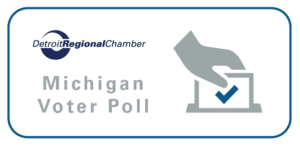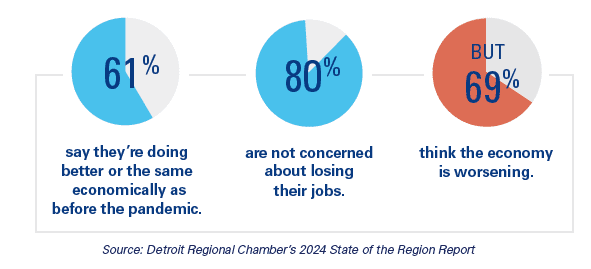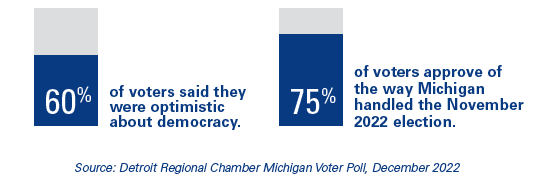When government pursues regulatory, labor, legal, or tax policies that increase the cost of doing business, it diminishes Michigan’s global competitiveness. The Chamber will support policies that emphasize Michigan’s competitive advantages, eliminate its disadvantages, and streamline government processes to grow the state’s economy.
Priority Policies
- Streamline Michigan’s permitting process to ensure certainty in the cost and timeliness of doing business.
- Prevent local governments from setting local labor regulations.
- Maintain competitive payroll tax levels for employers and employees.
- Manage benefits efficiently, engaging private sector solutions to maintain quality and reduce fraud.







 “Michigan is one of only two states in the country that can’t throw cash at a company. So, what can we do? … have a great workforce. We can have great partnerships so we can have sites that are ready. We can do a lot of things…to make sure that Michigan is competitive. And we’ve been successful in doing that, but we have to work.”
“Michigan is one of only two states in the country that can’t throw cash at a company. So, what can we do? … have a great workforce. We can have great partnerships so we can have sites that are ready. We can do a lot of things…to make sure that Michigan is competitive. And we’ve been successful in doing that, but we have to work.”
 “We have to do a better job connecting [students] with future employment. We do a very poor job as a sector in articulating where the jobs are from day one and counseling them about the kinds of experiences and internships and co-ops that can really make them competitive once they apply.”
“We have to do a better job connecting [students] with future employment. We do a very poor job as a sector in articulating where the jobs are from day one and counseling them about the kinds of experiences and internships and co-ops that can really make them competitive once they apply.”
 “The clean energy transition is happening, and it is critical that Michigan is a leader in the technology development, manufacturing, and adoption of electric vehicles. At the same time, the transition will take time and needs to be balanced. Support for new EV sales and for those vehicles made in America is important as Michigan moves forward as a leader in the technology of today and tomorrow.”
“The clean energy transition is happening, and it is critical that Michigan is a leader in the technology development, manufacturing, and adoption of electric vehicles. At the same time, the transition will take time and needs to be balanced. Support for new EV sales and for those vehicles made in America is important as Michigan moves forward as a leader in the technology of today and tomorrow.”

 “Get in the damn aisle and solve…the problems that the people are seeing…Find out what the real answers are, and let’s not make them political answers. Let’s do things that are on behalf of the people, that they truly want us to solve as public officials elected for everyone.”
“Get in the damn aisle and solve…the problems that the people are seeing…Find out what the real answers are, and let’s not make them political answers. Let’s do things that are on behalf of the people, that they truly want us to solve as public officials elected for everyone.”
 “When we put people in positions of authority who deny the sanctity of our elections, we really do put the republic at risk. …We all have to support people we know will defend the Constitution and people who will do what’s right.
“When we put people in positions of authority who deny the sanctity of our elections, we really do put the republic at risk. …We all have to support people we know will defend the Constitution and people who will do what’s right.






